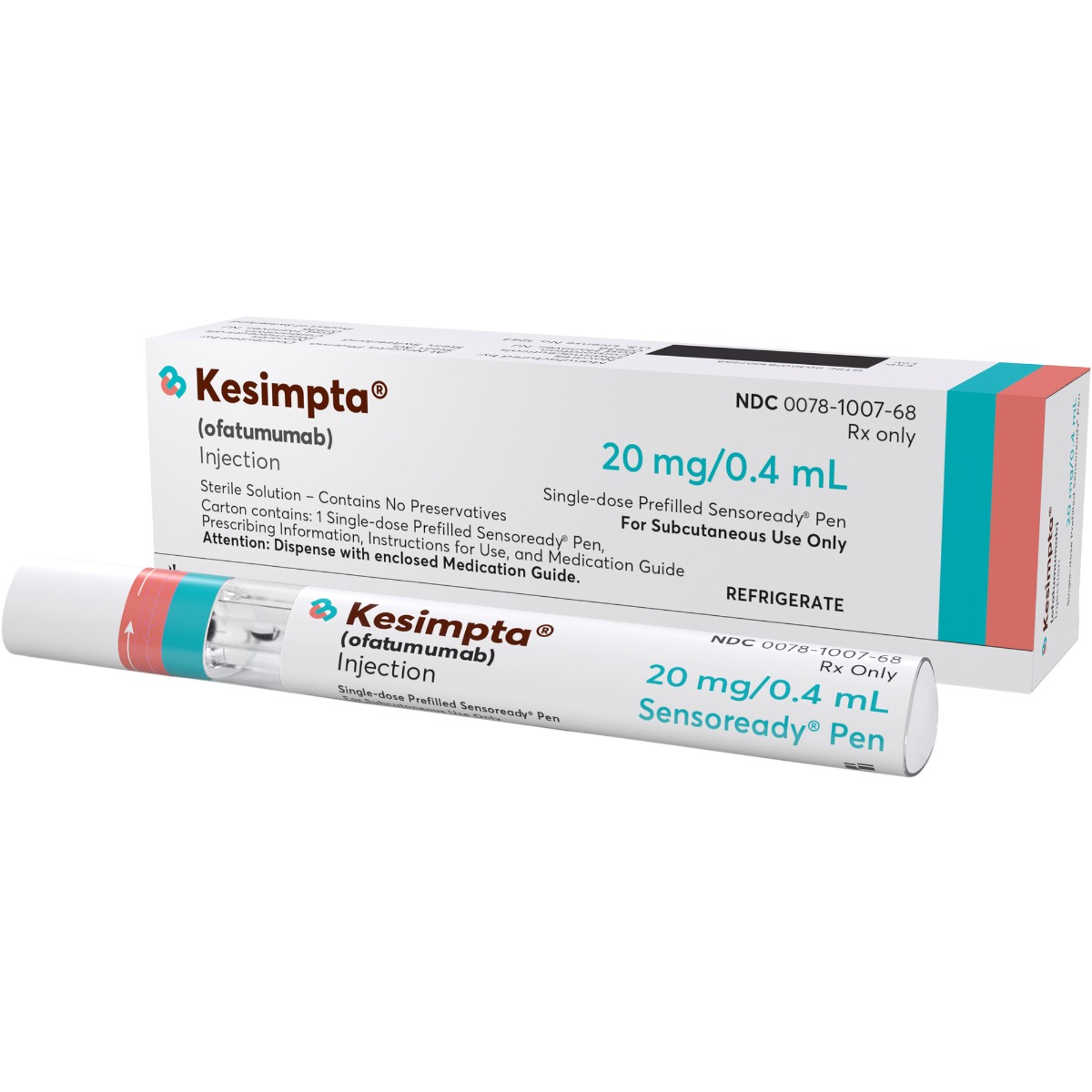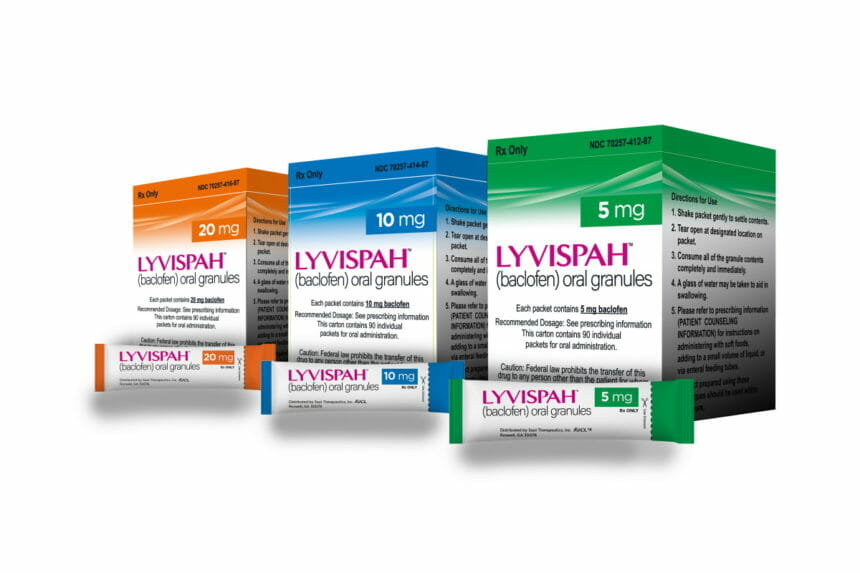Kesimpta (ofatumumab) vs Lyvispah (baclofen)
Kesimpta (ofatumumab) vs Lyvispah (baclofen)
Kesimpta (ofatumumab) and Lyvispah (baclofen) are used to treat very different medical conditions: Kesimpta is a CD20-directed cytolytic antibody indicated for the treatment of relapsing forms of multiple sclerosis (MS), aimed at reducing the frequency of relapses and slowing the progression of the disease, while Lyvispah is a formulation of baclofen, a muscle relaxer and an antispastic agent used to treat muscle symptoms caused by multiple sclerosis, including spasm, pain, and stiffness. Kesimpta is administered via subcutaneous injection, typically once a month after an initial loading dose, whereas Lyvispah is taken orally, with the dosage varying based on the severity of symptoms and patient response. When deciding between these medications, it is crucial to consider the primary health concern: Kesimpta is specifically for managing MS itself, while Lyvispah is for symptom relief related to muscle spasticity that can be associated with MS or other conditions.
Difference between Kesimpta and Lyvispah
| Metric | Kesimpta (ofatumumab) | Lyvispah (baclofen) |
|---|---|---|
| Generic name | Ofatumumab | Baclofen |
| Indications | Relapsing forms of multiple sclerosis (MS) | Spasticity due to multiple sclerosis, spinal cord injuries, or other spinal cord diseases |
| Mechanism of action | CD20-directed cytolytic antibody | GABA-B receptor agonist |
| Brand names | Kesimpta | Lyvispah, Lioresal, Gablofen |
| Administrative route | Subcutaneous injection | Oral, intrathecal |
| Side effects | Upper respiratory tract infection, headache, injection site reactions, and local injection site reactions | Drowsiness, dizziness, weakness, fatigue, headache, insomnia, nausea, increased urinary frequency or urinary retention, constipation |
| Contraindications | Hypersensitivity to ofatumumab or to any of its excipients | Hypersensitivity to baclofen, patients with impaired renal function, stroke patients, patients with epilepsy and psychotic disorders |
| Drug class | Monoclonal antibody | Muscle relaxant, antispastic agent |
| Manufacturer | Novartis | Varies by brand; for example, Lyvispah is manufactured by Saol Therapeutics |
Efficacy
Kesimpta (Ofatumumab) Efficacy in Treating Multiple Sclerosis
Kesimpta (ofatumumab) is a medication approved by the U.S. Food and Drug Administration (FDA) for the treatment of relapsing forms of multiple sclerosis (MS), which include clinically isolated syndrome, relapsing-remitting disease, and active secondary progressive disease in adults. As a CD20-directed cytolytic antibody, Kesimpta works by targeting B cells, which are believed to play a key role in the pathophysiology of MS. Clinical trials have demonstrated that Kesimpta is effective in reducing the annualized relapse rate (ARR) in patients with relapsing forms of MS. Additionally, Kesimpta has shown a reduction in the number of new or enlarging T2 and gadolinium-enhancing lesions on MRI scans, which are indicative of disease activity.
The efficacy of Kesimpta was established through a series of pivotal Phase III clinical trials, such as the ASCLEPIOS I and II studies. These trials compared Kesimpta to teriflunomide, another MS medication, and found that Kesimpta significantly reduced the ARR and the risk of disability progression that was confirmed at three and six months. The safety and efficacy profile of Kesimpta makes it a valuable treatment option for individuals with relapsing forms of MS, offering the convenience of once-monthly self-administration after initial dosing.
Lyvispah (Baclofen) Efficacy in Treating Multiple Sclerosis
Lyvispah (baclofen) is primarily indicated for the treatment of spasticity, which is a common symptom in patients with multiple sclerosis (MS). Spasticity is characterized by involuntary muscle stiffness and spasms, which can be painful and debilitating. Baclofen is a muscle relaxant and antispastic agent that acts on the central nervous system to relieve these symptoms. While Lyvispah is not specifically approved for MS, it is commonly used off-label to manage MS-related spasticity due to its efficacy in this area.
The effectiveness of baclofen in treating spasticity in MS patients has been supported by numerous studies and clinical experience. It works by activating GABA-B receptors, which results in decreased excitatory neurotransmitter release and reduced muscle tone. Patients with MS who experience spasticity may find significant relief with baclofen, improving their mobility and quality of life. However, the response to baclofen can vary among individuals, and it may be necessary to adjust the dosage to achieve optimal benefits while minimizing side effects. It is important for patients to work closely with their healthcare provider to determine the most effective and safe dosing regimen for their specific needs.
Regulatory Agency Approvals
Kesimpta
-
European Medical Agency (EMA), European Union

-
Food and Drug Administration (FDA), USA

Lyvispah
-
Food and Drug Administration (FDA), USA

Access Kesimpta or Lyvispah today
If Kesimpta or Lyvispah are not approved or available in your country (e.g. due to supply issues), you can access them via Everyone.org.
How it works

Make an enquiry
Choose the medicine you want to buy, answer a couple of questions, and upload your prescription to speed things up. We’ll get back to you within 24 hours.


Make an enquiry
Choose the medicine you want to buy, answer a couple of questions, and upload your prescription to speed things up. We’ll get back to you within 24 hours.


Breeze through the paperwork
We'll guide you through the required documents for importing unapproved medicine, ensuring you have all the necessary information.


Get a personalized quote
We’ll prepare a quote for you, including medicine costs and any shipping, administrative, or import fees that may apply.


Receive your medicine
Accept the quote and we’ll handle the rest - sourcing and safely delivering your medicine.

Some text on this page has been automatically generated. Speak to your physician before you start a new treatment or medication.
Let's talk
If you have any questions, call us or send us a message through WhatsApp or email:
Contact us




